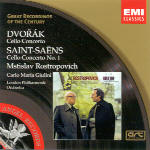This is the dullest of all of Rostropovich’s umpteen recordings of the Dvorák. The fault is Giulini’s. My god, he’s boring! He trudges through the first movement’s opening tutti like a pack mule pulling a heavy load up a steep hill. Has the cadence theme that precedes the soloist’s first entrance ever sounded more sluggish? And let’s face it, great artist though he is, Rostropovich will milk a tune from here to eternity if you give him too much encouragement. From its murky opening march to the terminal torpor that settles over its coda, the finale simply dies. The slow movement would be lovely in a different context, say, between two quick ones, as Dvorák intended. Here it’s just one of a tedious threesome. The Saint-Säens, on the other hand, comes off very nicely, with a particularly lithe and supple central Allegretto con moto. It may not eclipse memories of Fournier on DG, but it’s awfully good.
The sonics, though, are not impressive. In the Dvorák, tuttis seriously lack clarity, bass lines and timpani turn to mush, and the spotlight on Rostropovich only emphasizes the inadequacies of his partners. The Saint-Säens, more lightly scored throughout, fares better in this respect, but it’s still not going to win any awards for engineering. Tradition tends to favor Rostropovich’s DG recording with Karajan as his finest version of the work, and as a reference edition in general. It’s very good. But if you want Rostropovich at his best, you’ll do better to get Supraphon’s CD partnering him with Talich and the Czech Philharmonic, or for more modern sound the equally splendid Ozawa/BSO rendition on Erato. This latter features fabulous sonics, Rostropovich playing with his loveliest tone ever (on what was then a “new” Stradivarius cello, if I’m not mistaken), and a fresh, rhythmically alive accompaniment from Ozawa that knocks a couple of minutes off Giulini in the outer movements. You won’t be sorry.
































